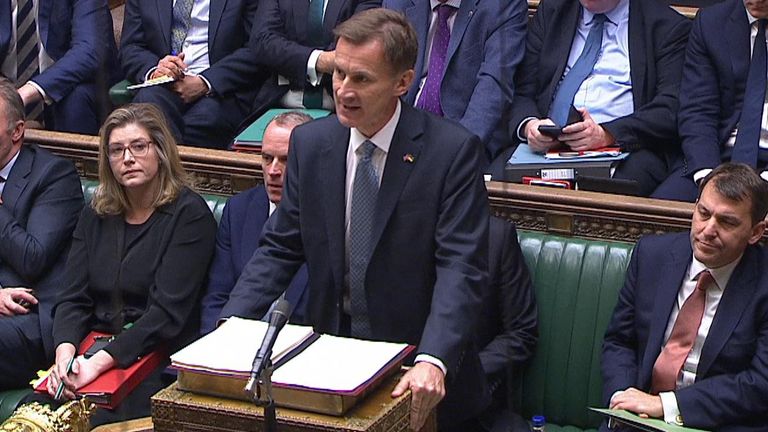Millions more Britons will pay more tax as Jeremy Hunt cut the top-rate of tax threshold and announced freezes on several other taxes in his autumn statement.
The chancellor said the 45p higher rate of tax will now be payable from £125,140, as opposed to the current £150,000.
He said those earning £150,000 or more will now pay just over £12,000 more a year.
The total amount of savings from the autumn statement has been costed at £55bn, through raising taxes and cutting government spending.
Hunt announcing tax rises and spending cuts – follow autumn statement live
The chancellor said the government is introducing two new fiscal rules: that underlying debt must fall as a percentage of GDP by the fifth year in a rolling five-year period, and public sector borrowing over the same period must be below 3% of GDP.
He said he had “tried to be fair” in his decisions by asking those “with more to contribute more” and avoiding tax rises that “most damage growth”.
Mr Hunt promised to “protect the vulnerable” and said his plan will lead to “a shallower downturn and lower energy bills”, while revealing his three priorities: “stability, growth and public services”.
He increased benefits in line with inflation, said the pensions triple lock will stay as is, and expanded the windfall tax on energy companies’ profits.
The extension of the windfall tax will take place from 1 January 2023 and last until March 2028, with energy giants having to pay 35%, instead of the current 25% on their profits.
And there will be a temporary new 45% levy on electricity generators, which is in addition to the tax on the companies that provide energy to households and businesses.
He also said electric car owners will no longer be exempt from vehicle excise duty from April 2025.
Much of the chancellor’s statement had been pre-briefed following the economic turmoil the mini-budget created after his predecessor announced surprise unfunded tax cuts.
But Mr Hunt did pull some rabbits out of his hat, including investing an extra £2.4bn per year on schools.
As was expected, he increased the NHS budget by £3.3bn and said he has asked former Labour health secretary Patricia Hewitt to advise on how to make sure the new Integrated Care Boards work properly.
Adult social care will get £1bn more next year and £1.7bn in 2024 and he said all together, along with previous commitments, that means the government is committing to a “record £8bn” package for the health and social care system.
He announced a freeze on income tax personal allowance, the main national insurance thresholds and inheritance tax thresholds for a further two years, until April 2028.
On personal income allowances, he said the dividend allowance will be cut from £2,000 to £1,000 next year then to £500 from April 2024.
And on help for energy bills, Mr Hunt said the Energy Price Guarantee will continue for a further 12 months from April 2023 at a higher level of £3,000 per year for the average household. It is currently capped at an average of £2,500.
There will also be additional cost of living payments next year for the most vulnerable, with £900 for households on means-tested benefits, £300 for pensioner households and £150 for those on disability benefits.
Social housing rents will have their increases capped at a maximum of 7% in 2023-24, he added.
And the hourly minimum wage will increase by 9.7% from April next year to £10.42 from the current £9.50.
On Sunday, Mr Hunt told Sky News everybody would be facing higher taxes but “it’s not just going to be bad”.
He also said those earning the most would be paying more as he promised to protect the most vulnerable.
Some senior Tory MPs had been rallying against higher taxes ahead of the autumn statement, with two dozen Conservatives sending an 11th-hour petition to the chancellor on Wednesday evening asking him to cut fuel duty.







